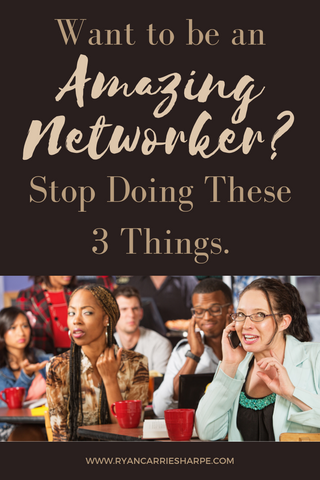
Want to be an Amazing Networker? Stop Doing These 3 Things.
Networking is a hot topic.
Recently I asked our community members to tell me about the kind of networking behaviors that drive them crazy.
Their responses were overwhelming.
It seems we've all experienced some pretty lousy networking tactics over the years, and it's time to put a stop to it. Networking takes a lot of time and energy, so don't waste yours on ineffective (and totally cringe-worthy!) tactics.
If you want to get good results from your networking efforts, stop these behaviors immediately:
1. Making it all about you.
If you spend the entire networking event talking about yourself and your needs, you've missed an opportunity to develop connections and relationships with others (which, by the way, is the actual point of networking). If the majority of your sentences start with "I" you may be making it all about you.
Veronica Staudt shared this experience: "It was when I was sold a 'networking' event where someone I wanted to meet/hear speak was the highlight. The person never showed up to the event. In fact, the organizers then said, 'You can still speak/network with her at an after party,' which was all the way across town. Even though I was a bit perturbed, I said fine, I attended the original event and the afterparty. Once at the Afterparty, said speaker networked with people for only 30 minutes because she had to leave for another event to emcee."
Kathryn Young said, "I think the very worst is to always have your hand out for help or sales and leads but do nothing to help others. I tell my group, be of service first. Build a relationship. Networking is a long game. Play it well."
Indeed.
2. Forgoing basic etiquette and social skills, both in-person and online.
Networking should serve to increase your know-like-trust factor with others, but if you are rude, obnoxious, or oblivious to social cues, you'll blow it.
"It's hard when you're trying to network at an event and the person you're speaking with is missing the social cues that you'd like to wrap up the conversation. At that point, you must become much more obvious (and potentially a bit awkward) so that you can have other conversations," said Suzanne Brown.
Speaker and Author Sasha Gray said, "When you're at a networking event, and some people never get up out of their seat or off their phone to actually network, you wonder who is sending them to this event, and if they are just there for the food. When I go to an event specifically for networking, I want to meet as many people as I can, make connections with as many as possible, and be able to follow up with them that week. If I never see your face, I can't do that."
"I used to help facilitate the weekly networking group for our local chamber of commerce. The most frustrating thing we ran into was a complete lack of respect for time limitations. Each person was allowed 30 seconds for an elevator pitch. I had a timer set to go off at 30 seconds, then another 10 seconds and then another 5 seconds. I had the volume turned up all the way on my phone so everyone could hear, but there were always a couple people who felt those rules never applied to them. The same thing with the 15 minute presentations. Networking isn’t just about getting your name out there. It’s also about showing due respect to others, including honoring their time," said Susan Whitehead.
Robin Oakes added, "Getting a friend request from someone whose page clearly only markets their products and you don't have any connections to that person or interest in what they are marketing. I currently have one I haven't declined yet."
Use good manners, friends. The Golden Rule is still a thing.
3. Hard-selling your products and services to people you have no relationships with and whose needs you don't know.
Sunit Suchdev shared this example: "Getting a private message in my dm inbox on Instagram when I follow someone new- they instantly send me a robotic automated message thanking me for the follow and asking if I’d like to buy their product, join their group etc etc. It’s clear that they haven’t done any research on who I am or what I do- many times the product or service they sell is the same as me. Even if I politely decline, they’ll follow up a few months later and say 'I’m just checking in to make sure you’re still good,' and they obviously still don’t know what I do. I don’t want to take the time to explain that I already have a health and wellness business or already sell essential oils because if they took a minute and learned about me they would know that.... but at the same time, if I politely say no they follow up again. It gets really annoying. I get several of these a day."
Virtual Assistant Lori Evans added, "Two days ago I was invited to a group for curvy singles. I’m neither single nor particularly curvy. I declined the invite. Today I was invited again. So I had no choice but to unfriend the person who invited me. I’ve also never spoken to this person before."
Jen Snyder gave perhaps the most poignant example of a hard sell gone wrong: "Hi! I haven’t talked to you since first grade but I see you’re fat now. Would you like to try my MLM product?"
OMG.
Networking is a vital business-building skill that we all need to master. Knowing which behaviors to avoid is essential to success. We've talked a lot here about what not to do when it comes to networking. For details on what to do, click here. Then head over to our Speaking Society to talk more about networking, public speaking, and other communication skills that will grow your business or career.






